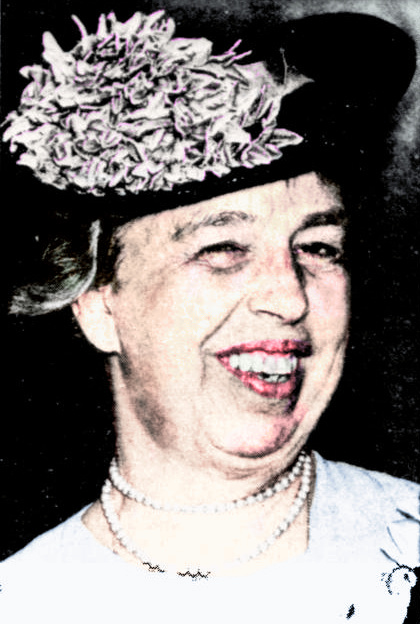
MY DAY
By Eleanor Roosevelt
February 1, 1940
Washington, Wednesday –
Every year, I think the group of young movie stars who come to the Birthday Ball parties are the nicest group that we ever had. I think back, however, and decide that all our guests have been equally as attractive, and I wish we could see them all again. We had a nice luncheon party yesterday and toured the White House. In the evening, I met these young people again as I made my rounds of the different balls. The crowds were greater at every one of the parties last night and I wish the President could feel the spirit of these crowds. His speech conveyed, I hope, to everyone his great appreciation of what this great peacetime army accomplishes each year.
I visited two more District of Columbia institutions this morning. I think I will begin by telling you something of the second one which I saw. It is the Industrial Home School for White Children. Here the Board of Public Welfare cares for young white boys and girls under eighteen years of age. It is not a model institution. The buildings are old, the personnel is not entirely adequate, but it is of higher calibre and the management is better than in many other institutions.
I happened to be there at dinner time. They are served cafeteria style, so that the food is warm and palatable. My only criticism is that the servings did not seem to me very plentiful for growing children, but they do put a good deal of their food money into milk, and there is supervision and extra food for undernourished people. Because of the fact that they have a better personnel, there is a planned program of recreation and there is a public school on the premises. All of which, together with the work they have to do, makes this a much better life for young people. There should be, however, a new cottage type of institution on the outskirts of the city where a farm can be part of the educational program.
The other institution which I visited, is the Receiving Home For Children, where both white and colored are sent. The dormitories are crowded and inadequate, recreation space allows for no segregation, so that a little 6-year-old boy spends his day with boys of eighteen, who may have committed some really serious offenses. Medical examination is delayed and there is no program of recreation or education and no space for it. Of course, children are supposed to stay only a short time, but they may be here for three or four weeks.
Three small boys of six, eight and nine were there today as lodgers, because their mother had to go to a hospital and they were left without any care. They were attractive looking youngsters you would have been glad to take to your own home and look after. I don’t know why it should be so, but the attendants told me that it is rare that colored children are left uncared for, for someone in the neighborhood nearly always takes them in.
Both of these institutions should be doing a real job of rehabilitation. As far as the receiving home goes, it would be impossible to do anything of that kind and I think if you visit it you will come away with a heartache. There is just one cheerful note, and that is the decoration done by WPA artists. In both institutions they give a note of color and cheer.